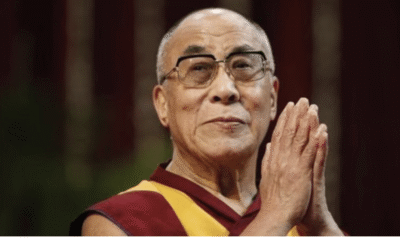
|
Getting your Trinity Audio player ready...
|
(The article was originally published in Indian Express on February 17, 2024 as a part of Dr Madhav’s column titled ‘Ram Rajya’. Views expressed are personal.)
These days, there is palpable unease among sections of political scientists over a perceived increase in “democracy deficit” and the rise of “strong man democracies” in different countries. The Economist magazine released its annual Democracy Index this week, bemoaning that this year was “not an auspicious one for democracies”. While ranking countries under four categories, it placed India in the second category of “flawed democracies”, just below the “full democracies” category. Interestingly, it also placed other big countries like the USA and Indonesia in that category. While full democracies secured above 8 out of 10 points, the so-called flawed ones, not faring too badly, secured above 7.
Interestingly, India has remained in that category since 2006, improving its score in the last decade from 6 to above 7. Several African nations are under the “hybrid category”, while China, which denies political freedoms to people, is placed under the category of “authoritarian regimes”. Pakistan, Iran and Myanmar, among dozens of others, are giving it august company in this lowest category.
These rankings may or may not reflect the complete reality of a country. But the fact remains that governments in several countries today seek to exploit technological advances to not only provide “smart governance”, but also to create a “surveillance state”. Some governments put a lot of emphasis on building physical infrastructure like dams, roads, and airports to achieve “ease of living” and “ease of mobility”, not bothering about the human and environmental costs. For some others, only “ease of doing business” and “ease of innovation” matter.
Viewed from this background, the keynote address delivered by Prime Minister Narendra Modi at the World Governments Summit in Dubai earlier this week acquires great significance. Speaking the second time at this prestigious forum, attended by many heads of state and ministers, on the theme of “Shaping Future Governments”, Modi made several important observations. He insisted that governments should not only be “smart”, but also “inclusive”, “non-corrupt” and “transparent”, adding that besides ease of living, mobility and doing business, there should be “ease of justice” as well.
Highlighting the “people-centrism” of his governance model, Modi reiterated his regime’s commitment to the principle of “minimum government, maximum governance”. He underscored the need for a “whole of society” approach instead of the “whole of government” approach. Citing schemes of his government like the Jan Dhan Yojana, Swachh Bharat Abhiyan and LiFE (Lifestyle For the Environment) campaign, which emphasise the “bottom-up” approach of making people primary stakeholders in the government’s development campaigns, he told the audience that “we have witnessed many transformations in Bharat following this principle of ‘people-centrism’”.
“People-centrism” as a governance model is unique to the Modi government. It is the secret behind his invincibility. The sense of empowerment he accorded to the citizens and the direct connection he has established with them makes it extremely hard for his political adversaries to challenge Modi. As people become direct stakeholders, intermediate agencies like the media, power elite, and, to some extent, even the political establishment become less relevant. While the empowered people are elated, the disempowered sections crib and complain about their own growing marginalisation.
One leader who applied this principle of empowering the masses was Mahatma Gandhi. In his grand design to bring the mighty British to their knees, Gandhi resorted to massive non-violent mass movements. He not only outgrew the Congress but did not hesitate to deploy religious and cultural symbols. His methods transformed the nature of Indian political resistance to the British.
No two leaders can be compared, especially ones seven or eight decades apart. It was a different challenge for Gandhi to mobilise the masses against a foreign government. But in Modi’s case, the mobilisation was to make them shoulder responsibility for their own future. It was “democracy at the grassroots”, unknown in classical Western discourse.
Desperate at the scale at which Modi has implemented this people-centrism, his adversaries complain about autocracy and cultism. Incidentally, Gandhi too faced similar criticism, not only from the British but also from his own countrymen. Radical humanist leader M N Roy went to the extent of stating privately that he wished “to destroy the curse of Gandhism”. So did Ambedkar. Jayaprakash Narayan (JP) disagreed with Gandhi initially. But in the end, everyone realised how fundamental and organic Gandhi’s approach had been in the context of a civilisational nation like India. Roy publicly praised Gandhi after Independence, while JP not only turned a Gandhian but declared in his “Manifesto for Bihar” that had Gandhi lived for five more years, he would have mobilised the masses against the rulers. What Gandhi couldn’t do, JP did in 1975 by mobilising the countrymen against the dictatorship of Indira Gandhi.
In a speech, “Back to the Mahatma”, JP had argued that “the leaders of the country must go to the people, to live and work with them, to serve, guide and help them. They must do all this not to strengthen their parties and gather votes for themselves but in order that the people should rise and put their heads, hearts and hands to the tasks of national development”.
Modi was talking about that role for the governments in the world, not the all-powerful and authoritarian one that people in many countries experience today. By asserting that “Sarkaron ka abhaav bhi nahi hona chahiye aur dabaav bhi nahi” — “there shouldn’t be a lack of governance, but there shouldn’t be an overbearing governance either” — Modi was echoing Gandhi, who viewed “an increase in the power of the state with the greatest fear”, because it does “the greatest harm by destroying individuality which lies at the root of all progress”.




